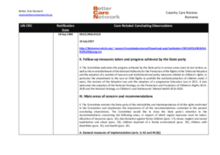Displaying 131 - 140 of 221
This study investigated the prevalence of abuse experienced or witnessed by Romanian children living in long-term residential centers in 1999.
This study presents the findings from a secondary analysis of data collected in 1999, which focused on child abuse and neglect within long-term residential centers in Romania, from a child rights perspective.
This country care review includes the care-related Concluding Observations adopted by the Committee on the Rights of the Child during the seventy-fifth session (15 May 2017 - 02 Jun 2017) of the Convention on the Rights of the Child.
The aim of this study was to identify the processes that support the good results obtained by the teenagers and young persons who reside in the largest residential centre in the county of Iași, Romania and their concerns regarding the future.
On 20 June, the Advisory Group for Childonomics, a research projected intended to develop a tool to determine long-term social and economic return of investing in children, met in Brussels for its final meeting. The final output of the project in pilot countries Malta and Romania is scheduled to be presented at the International Foster Care Organisations (IFCO) World Conference in November 2017.
This article focuses on the assessment of the effects of early institutional care and compares three longitudinal studies from Romania, Greece and Hong Kong/China.
In this Stahili article, Clemmy Rich describes her two-week experience as a "voluntourist" in a Romanian orphanage and discusses the need for more informed volunteering.
Romania's Institute for the Investigation of Communist Crimes has demanded an official investigation into 771 deaths in the dismal Communist-era orphanages for disabled children.
A researcher studying Romanian children who were institutionalized as infants describes the impact of social deprivation on the developing brain and their similarities to children with autism. This article suggests understanding the autism features appearing in children who were socially deprived as invants may offer insight into autism more generally and hint at interventions to ease them.
This study employed event-related potentials (ERPs) to examine the neural correlates of facial emotion processing in 12-year-old children who took part in a randomized controlled trial of foster care as an intervention for early institutionalization.



